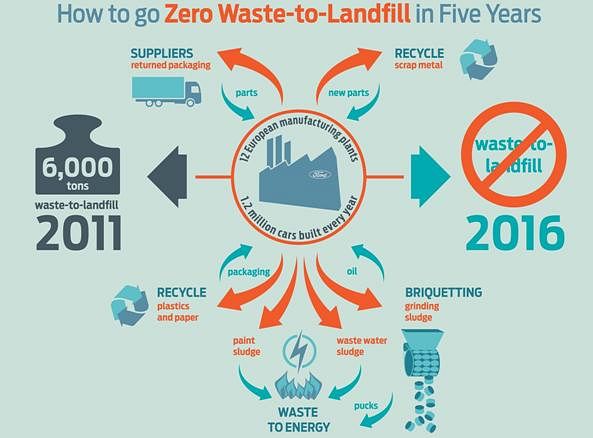Ford achieves zero waste-to-landfill milestone in Europe
The latest plants in Europe to achieve zero waste-to-landfill status are Valencia, and Craiova, in Romania, which join plants in Bridgend and Dagenham, in the UK; in Bordeaux, in France; and Cologne and Saarlouis, in Germany.
Ford of Europe has achieved zero waste-to-landfill at all of its European manufacturing plants. Eliminating 6,000 tonnes of waste per year, that was previously sent to landfill, compared with 2011 – equivalent to the annual waste discarded by a town of 12,500 people, for the 1.2 million vehicles that Ford produces in Europe each year.
Innovative measures were employed to achieve zero waste-to-landfill include the briquetting of grinding sludge from the Dagenham engine plant, in the UK, so that the oil can be re-used in the production process. At the Valencia plant, in Spain, Ford pioneered generating alternative fuel from waste that could not be recycled.
“We have introduced a range of measures that have not only significantly reduced our reliance on landfill for our manufacturing plants, but removed it entirely. This achievement is a fantastic base to push on from and further improve in areas such as water and electricity usage reductions as Ford of Europe drives towards the company’s global sustainability ambitions,” said Andreas Reiss, manager, Environmental Quality Office Europe, Ford of Europe.

The latest plants in Europe to achieve zero waste-to-landfill status are Valencia, and Craiova, in Romania, which join plants in Bridgend and Dagenham, in the UK; in Bordeaux, in France; and Cologne and Saarlouis, in Germany.
In 2015, Ford in Europe rolled out a new Energy Management Operating System within its production system, enabling teams to manage demand and remotely control plant energy and heating systems for greater energy efficiency. This is part of an energy strategy that has resulted in a 25 percent reduction in energy use compared with 2011, equivalent to an annual saving of 800 gigawatt hours. Between 2013 and 2015 Ford has also reduced its global water usage per vehicle produced to 3.81 cubic metres from 4.04 cubic metres and decreased carbon dioxide emissions per vehicle produced from 0.78 cubic tonnes to 0.72 metric tonnes.
You may like: Ford first automaker to develop vehicle plastics using captured CO2
RELATED ARTICLES
Autoliv Plans JV for Advanced Safety Electronics With China’s HSAE
The new joint venture, which is to be located strategically near Shanghai and close to several existing Autoliv sites in...
JLR to Restart Production Over a Month After September Hacking
Manufacturing operations at the Tata Group-owned British luxury car and SUV manufacturer were shut down following a cybe...
BYD UK Sales Jump 880% in September to 11,271 units
Sales record sets the UK apart as the largest international market for BYD outside of China for the first time. The Seal...






 By Autocar Professional Bureau
By Autocar Professional Bureau
 01 Jul 2016
01 Jul 2016
 4557 Views
4557 Views





 Ajit Dalvi
Ajit Dalvi




